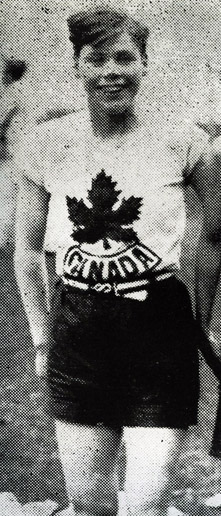Hall of Famer
Florence Jane Bell
Inducted in 1955
Member Details
Career Highlights
Member, the 'Matchless Six' Canada's first women's Olympic track team
Gold medal, 4 x 100m relay, Olympic Games

Story
The year 1928 was a monumental one in sport for women. Despite much public protest over the unladylike deportment of female athletes, as well as numerous allegations about the unhealthy consequences of vigorous physical activity on the female body, women were permitted to compete in track and field at the Amsterdam Olympics that year. No Olympic team made a better case for the tremendous ability of women athletes than the "Matchless Six," Canada first and most famous female track team. The six women were successful in a number of events, but their crowning moment came when four of the six members-Bobbie Rosenfeld, Myrtle Cook, Ethel Smith, and Jane Bell-took the gold medal in the 4 x 100m relay race. Though they were not all well acquainted before the Games, these four women had similar sporting backgrounds. Growing up in and around Toronto, they had all been active in athletics throughout their youth, and each showed significant talent in a wide variety of sports. At only 18, Jane Bell was the youngest member of the “Matchless Six”. Born in Toronto in 1910, her skills were not limited to track and field. She was equally a standout swimmer, basketball player, and hurdles jumper. At the first Canadian women's track and field championships, she set a record in the 50-yard hurdles. The 1928 Olympic trials in Halifax drew the most talented female athletes from across the country. Cook, Rosenfeld, Smith, and Bell were pitted against each other in the 100m race. Smith won the first heat, Cook the second, and Rosenfeld the third. In the finals, Cook set a world record of 12.0 seconds. All four were chosen for the Olympic team, along with champion high-jumper Ethel Catherwood and 800m runner Jean Thompson. The Matchless Six was born as was a new era in Olympic sports. Until this time, Smith, Bell, Cook, and Rosenfeld had competed against each other, but never as a team. Luckily, they had a ten-day boat journey across the Atlantic to practice and perfect their baton passing. Before working together, however, Cook, Rosenfeld, and Smith were opponents once more in the 100m event. With a world record to her name, Cook was the gold-medal favourite in Amsterdam, but she was disqualified after two false starts. Rosenfeld and Smith raced on. Smith claimed the bronze medal, while Rosenfeld and American sprinter Betty Robinson were so close at the finish line that the judges were divided over who had actually broken the tape. After much contestation, the gold medal was awarded to the American, while Rosenfeld took a respectable silver. During the preliminary heats for the 4 x 100m relay, Rosenfeld, Smith, Bell, and Cook easily took the lead and finished the course in a record time of 49.4 seconds. The finals brought tremendous hopes for a gold medal for Canada as these four women took their places at the starting line. Rosenfeld, the lead runner, took a false start at the beginning of the relay but broke away cleanly with the starting pistol the second time around. She quickly established a lead for the Canadians before passing the baton to Smith. Smith sped around the course and handed it to Bell, who steadily increased their lead. Cook, the anchor of the team, was still slightly shaken from her failure in the 100m event. When Bell approached for the pass, Cook took off a little too quickly, and was almost out of the passing zone by the time Bell caught up to her with the baton. Though she teetered on the edge of disqualification once more, Cook managed to make a clean pass, and fully redeemed herself as she increased the Canadians' lead and crossed the finish line a full five metres ahead of the second place team. To add to their golden triumph, these four women finished the course in a record time of 48.4 seconds, bettering their previous record by almost a full second. To cap off their success, teammate Ethel Catherwood claimed the gold medal in the high jump, while Jean Thompson took fourth place in the 800m race. With two gold medals, a silver, a bronze, and 26 points in total, they had the top women's score at the Games, making the Matchless Six one of the most successful Canadian Olympic teams in history. Upon their return to Canada, these Olympic champions were greeted by more than 200,000 adoring fans at Toronto's Union Station, and the ensuing four-mile procession through the city was equally celebratory. Their achievements not only brought tremendous international recognition to Canada but helped to break down gender barriers in the athletic world and forge a new era in women's sport. Several members of the mighty Matchless Six remained advocates for women's participation in sport the rest of their lives. Bell went on to pursue a career in physical education, sharing her passion for sport with the next generation of female athletes. Both Rosenfeld and Cook enjoyed successful careers in sports writing, using their positions to help promote women's sports. Cook became known as "Canada's First Lady of Sport," while Rosenfeld was voted Canada's female athlete of the half-century in 1950. The pioneering efforts of these remarkable women opened a whole new world for female athletes, while their achievements continued to amaze and inspire.






